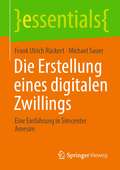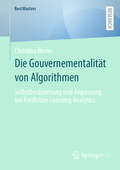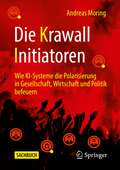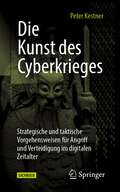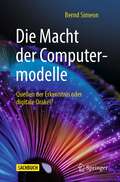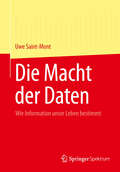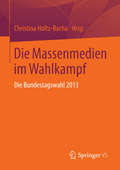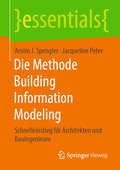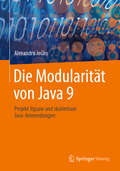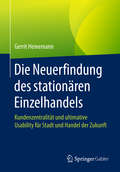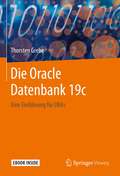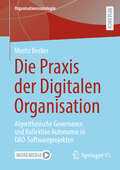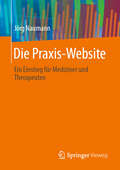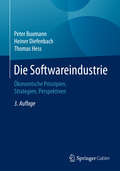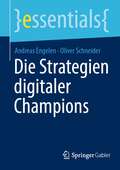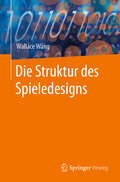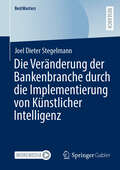- Table View
- List View
Die Effektivität von Online-Reviews in Hersteller-Online-Shops (Applied Marketing Science / Angewandte Marketingforschung)
by Katharina Elisabeth KessingOnline-Bewertungen können Einzelhändlern helfen, die Unsicherheit der Kunden vor dem Kauf zu verringern, die Conversion-Rate zu erhöhen und den Umsatz zu steigern. Aber gelten diese Vorteile auch für Hersteller und ihre eigenen Online-Shops? Auf der Grundlage sozialpsychologischer Theorien und sechs experimenteller Studien untersucht Katharina Kessing die unterschiedliche Effektivität von Online-Reviews in Hersteller- und Händler-Online-Shops und identifiziert dabei zwei gegensätzliche Effekte: Online-Reviews, die in Hersteller-Online-Shops veröffentlicht werden, werden tendenziell als manipuliert wahrgenommen, sodass Kunden dem Hersteller ein größeres kommerzielles Interesse unterstellen. Dies wirkt sich wiederum negativ auf die Kaufabsicht aus. Zweitens können Online-Reviews das Gefühl der Dankbarkeit der Kunden gegenüber dem Online-Shop verstärken, was ihre Kaufabsichten steigert. Abschließend werden zwei effektive Strategien zur Reduktion der schädlichen Auswirkungen von Online-Reviews im Hersteller-Online-Shop vorgestellt: unabhängige Quellen und multidimensionale Ratings. Die Ergebnisse können Herstellern bei der Entscheidung helfen, ob und wie sie Online-Reviews in ihren eigenen Online-Shops veröffentlichen sollten.
Die Erstellung eines digitalen Zwillings: Eine Einführung in Simcenter Amesim (essentials)
by Michael Sauer Frank Ulrich RückertDie Erstellung der ersten digitalen Zwillinge sollte intuitiv sein. In diesem Buch werden Zwillinge aus unterschiedlichen Bereichen vorgestellt, die ohne große Vorkenntnisse aufgebaut werden können. Dem Leser wird durch Praxisbeispiele ein Verständnis für die Handhabung von Simcenter Amesim vermittelt. Ohne tiefgreifende mathematische Fähigkeiten werden beispielsweise Lüftungs- und Tankanlagen, Sonnenkollektoren oder ein einfacher Wagenheber nachgebaut. Jedes Rechenbeispiel schließt mit Arbeitsvorschlägen, um den Umgang mit dem Zwilling zu schulen.
Die Gouvernementalität von Algorithmen: Selbstbestimmung und Anpassung bei Predictive Learning Analytics (BestMasters)
by Christina Berns„Die digitale Transformation ist eine Einbahnstraße in ein kybernetisches Zeitalter. Intelligente Maschinen nehmen den Menschen dort als steuernde Kraft allmählich das Zepter aus der Hand.“ Der Einzug prädiktiver Learning Analytics-Systeme in Schulen und Hochschulen könnte das Bildungswesen verändern und zur Transformation hochkomplexer gesellschaftlicher wie organisationaler Kontrolldynamiken der (Selbst-)Führung beitragen, die im konturierten Gegenstandsbereich noch wenig erforscht sind. Christina Berns rekonstruiert anhand der gouvernementalen Dispositivanalyse die produktiven, regulativen wie repressiven Dimensionen ubiquitärer, multimedialer, interaktiver und hyperkonnektiver Predictive Learning Analytics in der digitalisierten Studienberatung im Spannungsfeld zwischen Heteronomie und Autonomie aus machtanalytischer Perspektive. Die Analyse identifiziert Subjektivierungspraktiken und gesellschaftlich-politische wie ökonomisch-technische Rationalitäten, die einen Aufschluss über aktuelle technisch-mediale Lösungsversuche von Problemstellungen im Bildungswesen geben.
Die Industriedrohne – der fliegende Roboter: Professionelle Drohnen Und Ihre Anwendung In Der Industrie 4. 0
by Holm Landrock Anne BaumgärtelDrohnen sind mittlerweile zu intelligenten Systemen für Industrie 4.0 herangereift. Die neuen Flugroboter verfügen über Sicherheitstechnologien, Flugzeiten und Zuladegewichte, die für den Einsatz in der Energiewirtschaft, Behörden der Sicherheit und Verteidigung, Agrarwirtschaft, Kommunikation und Infrastruktur zunehmend nutzbar sind. Genau hier setzen die Autoren – Fachjournalisten mit Insiderwissen über Technik, Markt und Kundensicht – mit ihrem Buch an.Das kompakte Fachbuch gibt praktischen Einblick in den Aufbau und die Technik von Drohnen, sog. Multicoptern. Es zeigt zudem die Einsatzgebiete von Industriedrohnen und erläutert die wichtigsten gesetzlichen Regelungen und Vorschriften für Entscheider aus der Wirtschaft, in denen smarte Robotik aus der Luft relevant wird. Praxisbeispiele aus verschiedenen Branchen und Basisanforderungen an die Industriedrohne – dargestellt in übersichtlichen Tabellen – runden das Buch ab.Das Buch richtet sich an alle, die sich zum Wachstumsmarkt "Drohne" einen Überblick verschaffen möchten. Als Entscheider in der Industrie erfahren Sie hier, wie sich etwa Bereiche wie die Petrochemie oder die Landwirtschaft durch den Einsatz von Drohnen automatisieren lassen. Auch Sektoren wie der Katastrophenschutz und die Sicherheitstechnik profitieren vom Einsatz von Industriedrohnen und lassen sich durch sie noch effektiver gestalten. Auch Wissenschaftlern und Journalisten, die in den Bereichen Industrie 4.0 und Robotik forschen und schreiben und Privatleuten mit einem generellen Interesse an den Einsatzmöglichkeiten für professionelle Drohnen liefert das Buch kompakt und strukturiert alles Wissenswerte zu Multicoptern in den Zeiten der Industrie 4.0.
Die Krawall Initiatoren: Wie KI-Systeme die Polarisierung in Gesellschaft, Wirtschaft und Politik befeuern
by Andreas MoringEine zunehmende Polarisierung der Gesellschaft, identitäre Absolutismen, ein Neo-Feudalismus in digitalen Märkten, das Versagen unseres Bildungssystems, eine neue chinesisch-amerikanische Weltordnung und nicht zuletzt der Umgang mit dem Klimawandel: Alle großen Fragen unserer Zukunft führen früher oder später zu Künstlicher Intelligenz. Als Grund und Quelle dieser Entwicklungen. Und auch als der Schlüssel zu ihrer Lösung. Dieses Buch erklärt, wo diese Zusammenhänge liegen und wie die Wege zur Lösung aussehen müssen.
Die Kunst des Cyberkrieges: Strategische und taktische Vorgehensweisen für Angriff und Verteidigung im digitalen Zeitalter
by Peter KestnerDie Kunst des Cyberkrieges greift die strategischen und taktischen Vorgehensweisen für Angriff und Verteidigung im digitalen Zeitalter auf. Dazu bedient sich der Autor historischer Konflikte (von Sun Tsu bis Carl von Clausewitz) und deren Ausgängen, um aufzuzeigen, dass es ungeachtet der veränderten Bedingungen wie Zeit, Ort, Mittel und Ressourcen – nicht aber der physikalischen Gesetze – möglich ist, von früheren Aktionen und deren Reaktionen zu lernen.Der Autor möchte mit diesem Buch zeigen, dass wir in Wirklichkeit nur alte Methoden in unser jetziges Zeitalter transferiert, aber dabei vergessen haben, deren Gründe und Auswirkungen und natürlich die daraus resultierenden Lehren mit zu übersetzen. Denn wie schon vor tausenden von Jahren sind und bleiben die Gründe für menschengeschaffene Konflikte immer dieselben: Reichtum, Ruhm, Macht, Ehre oder Lust. Kann man aus der Geschichte etwas für heutige und zukünftige (Cyber-)Kriege lernen?
Die Macht der Computermodelle: Quellen der Erkenntnis oder digitale Orakel?
by Bernd SimeonUnsichtbar und zugleich omnipräsent, erobern sich Computermodelle ständig neue Anwendungsfelder. Ihre Macht verdanken sie den immensen Kapazitäten moderner Rechnersysteme, und sie wird zusätzlich befeuert durch das maschinelle Lernen aus riesigen Datenbergen. Digitale Patienten, Szenarien zum Klimawandel, Missionen zu fernen Planeten, das Jonglieren an den Finanzmärkten, die Entwicklung nuklearer Waffensysteme – anhand vielfältiger Episoden und persönlicher Erlebnisse des Autors bietet Ihnen dieses Buch Einblick in eine faszinierende Welt, die zu einer wesentlichen Quelle des Erkenntnisgewinns geworden ist. Doch die unaufhaltsame Mathematisierung schürt auch Ängste: Sind wir, wie Goethes Zauberlehrling, schon tief im Netz der Algorithmen und Computermodelle verstrickt und verlieren die Kontrolle über ihre Macht? Wie ein modernes Orakel stillen Computermodelle unsere Sehnsucht nach einer berechenbaren Zukunft. Doch es lauern Fallstricke, aufgrund derer ihre Prognosen gravierend danebenliegen können. Blindes Vertrauen beim Laien wie auch starre Modellgläubigkeit beim Experten resultieren dann in Fehlentscheidungen, dem Versagen technischer Systeme oder ökonomischem Desaster. Kann man diesen Fallstricken entgehen? Zum Lesen dieses Buches benötigen Sie Neugierde sowie Offenheit für Überraschendes, aber keine Fachkenntnisse. Eine Fülle von Abbildungen veranschaulicht die wesentlichen Zusammenhänge, ergänzt um spannende Anekdoten aus Wissenschaft und Technik. Wollen Sie mehr erfahren? Dann kommen Sie mit auf diesen Streifzug durch den Kosmos der Computermodelle.
Die Macht der Daten
by Uwe Saint-MontDieses Buch könnte Ihre Daten-Weltanschauung verändern. Unsere Leichtfertigkeit im Umgang mit Daten ist sträflich. Sie werden sinnlos erhoben, falsch ausgewertet, unterschlagen, geschönt dargestellt und unerlaubt gespeichert oder weitergegeben. All dies sind jedoch lässliche Sünden, wenn man sie mit dem größten Fehler vergleicht: auf Daten zu verzichten! Sachorientierte Politik, soziale Netze, das Bildungssystem oder die Wirtschaft funktionieren alle nur mit einem permanenten und zuverlässigen Datenfluss, der in die richtigen Kanäle gelenkt werden muss. Daten sind der Rohstoff unserer modernen Informationsgesellschaft, unser Anker im Boden der Tatsachen. Anhand von vielen Beispielen - vom Gartenvogel bis zum Geldmarkt - erklärt dieses Buch, wie wir mit Daten umgehen und welche Möglichkeiten wir bislang nicht nutzen. Wann wir ihnen zu viel zumuten oder zu wenig zutrauen. Und wie Daten uns viel umfassender als bisher helfen können, eine immer komplexere Welt zu verstehen.
Die Maschine: Mensch und Technologie im digitalen Zeitalter
by Caja Thimm Thomas Christian BächleDie Maschine – Freund oder Feind? Selbstverständlich folgt darauf keine eindeutige Antwort, denn in den bekannten Deutungen des Verhältnisses zwischen den Maschinen und den Menschen findet sich immer beides. Spätestens mit der industriellen Revolution ist die Maschine zum Objekt sehr ambivalenter Bewertungen geworden. Sie symbolisiert Fortschritt und Erlösung und gilt doch zugleich als Ursache und Antreiber gesellschaftlicher Konflikte. Eine ähnliche Ambivalenz ist auch heute zu beobachten: Die Angst vor der Maschine ist nicht nur mit Themen wie dem Verschwinden der Arbeit verbunden, sondern mit dystopischen Vorstellungen vom vollständigen Untergang der Menschheit: Künstliche Intelligenz beherrscht menschliches Denken und Handeln, die Manipulationsmacht durch digitale Großkonzerne führt zu einem „Feudalismus 2.0“. Gerade weil die Angst vor den Maschinen und ihren sozialen und politischen Auswirkungen als Topos aus dem größeren Kontext des Mensch-Technik-Verhältnisses bekannt ist, kommt der mit diesem Band verfolgten Aktualisierung dieser Debatte ein wichtiger Stellenwert zu.Der InhaltDie Maschine: Metapher, Mythos, Objekt ● Der Mensch als „Gehirnmaschine“ ● Die schöne neue Cyborg-Welt im japanischen Anime ● Autonome Systeme, Roboter und ethische Implikationen ● Digitaler Feudalismus ● Computer gegen Arbeiter: Digitale Technologien und das Verschwinden der Arbeit ● „Hochinvasive Überwachung“ ● Autonome Waffensysteme und die Imagination menschlicher Kontrolle ● Internetsucht ● Die Digitalisierung menschlicher ReproduktionDie HerausgeberDr. Caja Thimm ist Professorin für Medienwissenschaft und Intermedialität in der Abteilung Medienwissenschaft des Instituts für Sprach-, Medien- und Musikwissenschaft der Universität Bonn.Dr. Thomas Christian Bächle ist Medienwissenschaftler und leitet am Alexander von Humboldt Institut für Internet und Gesellschaft (HIIG) in Berlin das Forschungsprogramm „Die Entwicklung der digitalen Gesellschaft“.
Die Massenmedien im Wahlkampf
by Christina Holtz-BachaNoch während der Bundestagswahlkampf 2013 im Gange war, wurde er verschiedentlich als flau beurteilt. Die Kampagne ließ Highlights und Innovationen vermissen. Die Forschung zur Wahlkampfkommunikation gewinnt daher ihren Wert vor allem in der Langzeitperspektive, die es möglich macht zu prüfen, ob die oftmals diagnostizierten Trends moderner Kampagnen wie Professionalisierung und Personalisierung zutreffen und ob Verschiebungen in der Rolle und der Bedeutung der klassischen Medien auf der einen und Internet sowie sozialen Netzwerken auf der anderen Seite eintreten. Die Beiträge dieses Bandes analysieren die verschiedenen Mittel der Kampagnenkommunikation, die Berichterstattung der Medien und untersuchen Wirkungsfragen.
Die Methode Building Information Modeling: Schnelleinstieg für Architekten und Bauingenieure (essentials)
by Arnim J. Spengler Jacqueline PeterArnim J. Spengler und Jacqueline Peter bieten einen Schnelleinstieg in die BIM-Methodik. Zunächst geben sie einen grundsätzlichen Einblick, zeigen die Bedeutung von BIM auf und klären die wichtigsten Begrifflichkeiten des Themenfeldes. Danach wird die Methodik aus den unterschiedlichen Sichtweisen aller Akteure im Bauwesen entlang des Lebenszyklus eines Bauwerks beleuchtet sowie die wichtigsten Normen, Richtlinien und Vereinigungen vorgestellt und untereinander in Bezug gesetzt. Eine SWOT-Analyse zeigt kurz und prägnant Stärken, Schwächen, Risiken und Chancen von BIM. Im Anschluss gewähren die Autoren einen schnellen Einblick in die Forschung und geben einen kurzen Ausblick über neue Technologien wie Blockchain, Künstliche Intelligenz, Robotik und IoT in Verbindung mit der BIM-Methodik.Die Autoren:Arnim J. Spengler, M.Sc., forscht an der Universität Duisburg-Essen im Bereich Robotik und digitales Bauen, ist Teil der Projektgruppe „BIM-Competence-Center“ des MHKBG NRW, Mitgründer des BIM-Clusters NRW und des Construction-Tech Startups BuildersMind GmbH. Jacqueline Peter, M.Sc., lehrt und forscht am Institut für Digitalisierung im Bauwesen an der Universität Duisburg-Essen und ist stellvertretendes Koordinierungsmitglied im BIM-Cluster NRW.
Die Modularität von Java 9: Projekt Jigsaw und skalierbare Java-Anwendungen
by Alexandru JecanEntwickeln Sie modulare Anwendungen mit dem Java Platform Module System, dem am meisten erwarteten Feature von Java 9. Sie werden die Wartbarkeit und Leistung Ihrer Java-Anwendungen verbessern, indem Sie nur die Module einsetzen, die benötigt werden, und deren Implementierungsdetails kapseln. Bis jetzt war Java monolithisch. Die Verwendung eines beliebigen Teils von Java bedeutete die Einbindung der gesamten Laufzeitumgebung, ein Ansatz, der für die wachsende Zahl von IoT-Geräten wie Fitnessmonitoren, Küchengeräten, Spielzeugen und Spielen usw. nicht geeignet ist. Dieses Buch zeigt einen neuen Weg auf, wie Java vom kleinsten Fußabdruck im kleinsten Gerät über Desktop-PCs bis hin zu Serverplattformen skaliert werden kann. Mit Java 9 Modularity Revealed lernen Sie, Ihre Projekte zuverlässiger und skalierbarer als je zuvor zu machen, indem Sie die wichtigste Funktion von Java 9 nutzen - das Java Platform Module System, besser bekannt als Project Jigs. aw. Sie werden lernen, wie Sie einen der Hauptprobleme der Java-Programmierung vermeiden können, nämlich widersprüchliche Klassennamen aus verschiedenen Modulen oder Paketen. Sie werden lernen, benutzerdefinierte Laufzeit-Images zu erstellen, die eine minimale und kompaktere JRE darstellen und nur die Module enthalten, die Sie benötigen. Außerdem lernen Sie, wie Sie bestehende Java-Anwendungen mit Hilfe verschiedener Ansätze und Werkzeuge in modulare Anwendungen umwandeln können. Das Endergebnis ist eine neue Fähigkeit, verschiedene Module zusammenzustecken, ohne Angst vor Namensraum- und anderen Konflikten zu haben, und Sie können alles einsetzen, von kleinen Geräten bis hin zu großen Servern. Dieses Buch enthält Codebeispiele und Erläuterungen. Was Sie lernen werden Java-Anwendungen mit dem neuen, in Java 9 eingeführten modularen System erstellen ErstellenSie Ihre eigene JRE, die nur aus den von Ihnen benötigten Modulen besteht Anpassung Ihrer Testtechniken an modulare Anwendungen Ihre Abhängigkeiten von anderen Modulen aufzulösen Aktivieren Sie Module, die nur bestimmte Pakete exportieren Bestehende Java-Anwendungen in modulare Anwendungen umwandeln Verbesserung der Wartbarkeit und Leistung von Java-Anwendungen Für wen dieses Buch bestimmt ist Erfahrene Java-Programmierer, die über die neue Modularitätsunterstützung in Java 9 auf dem Laufenden bleiben und sich informieren möchten
Die Monte-Carlo-Methode: Beispiele unter Excel VBA (essentials)
by Harald NahrstedtHarald Nahrstedt zeigt hier den pragmatisch technischen und weniger den wissenschaftlichen Ansatz, wie Excel mit seinen Programmiermöglichkeiten sich immer mehr zu einem universellen Arbeitsmittel entwickelt. So ist die Simulation mit Hilfe von Pseudozufallszahlen ein schneller und preiswerter Weg zu fachlichen Aussagen. Den Rahmen dieser Abhandlung bildet der geschichtliche Hintergrund.
Die Neuerfindung des stationären Einzelhandels
by Gerrit HeinemannDieses Buch geht auf die besonderen Herausforderungen an den stationären Handel im digitalen Zeitalter ein. Anliegen von Gerrit Heinemann ist es vor allem, die lokalen Händler wachzurütteln und ihnen einen Weg aufzuzeigen, wie sie sich neu erfinden können. Diese haben nur eine Zukunft, wenn es ihnen gelingt, die Chancen des Internets zu nutzen. Dabei geht es nicht nur um einen zukunftsfähigen Online-Shop und seine Verknüpfung mit dem stationären Geschäft in Form von Multi-Channel-Services, sondern vor allem auch um zukunftsfähige Konzepte für die stationären Formate, damit Sie gegen die brutale Online-Konkurrenz eine Chance haben. Der Autor erläutert, wie der stationäre Handel neu erfunden werden und sich an den vom Kunden gelernten Erfolgsprinzipien des Online-Shoppings ausrichten kann. Dazu werden auch aktuelle Veränderungen im Kundenverhalten beschrieben und neue Wege zu einer Digitalisierung der Innenstädte sowie einer Neuausrichtung der Shoppingcenter aufgezeigt. Als Vorbild dient die Umsetzung der von Amazon erfundenen Kundenzentralität sowie der ultimativen Usability für Stadt und Handel der Zukunft. Der Inhalt- Der stationäre Handel im digitalen Zeitalter- Herausforderungen des stationären Handels- Neuerfindung des stationären Handels- Digitale Innenstadt und Shoppingcenter der Zukunft- Risk-Benefit im Handel der Zukunft
Die Online-Redaktion
by Thomas Holzinger Martin SturmerDie inhaltliche Entwicklung des Internets hält mit den technologischen Möglichkeiten kaum mit. Dass Online-Redaktion des öfteren als "Strafkolonie" für unliebsame Mitarbeiter betrachet werden und die technophile Selbstverwirklichung mancher Mitarbeiter, sind nur zwei der Ursachen dafür. In dieser Betriebsanleitung für multimediales Medienschaffen überschreiten die Autoren die Grenzen klassischer Mediengattungen und widmen sich in respektloser Frische der Professionalisierung von Internet-Redaktionen.
Die Oracle Datenbank 19c: Eine Einführung für DBAs
by Thorsten GrebeDiese Einführung in die Oracle Datenbankadministration bietet einen schnellen Einstieg in die Installation, den Betrieb und das Backup einer Oracle 19c Datenbank. Dabei liegt der Fokus auf Datenbanken, die nicht in der Cloud, sondern auf eigenen Servern (on premise) betrieben werden. Es wird gezeigt, wie eine Einzelinstanz als herkömmliche Non-CDB oder als Multitenant-Containerdatenbank aufgesetzt werden kann und wie beim Aufbau eines Real Application Clusters vorgegangen werden muss. Erläutert werden die Komponenten, aus denen eine Datenbank und ihre Instanz bestehen, die Bedeutung von Speicherbereichen und Schemaobjekten. Die Besonderheiten einer Containerdatenbank gegenüber der älteren Non-CDB Architektur werden beschrieben. Hinweise werden gegeben, welche Initialisierungsparameter besser auf ihren Vorgabewerten belassen und welche unbedingt angepasst werden sollten. Besonderen Raum wurde dem Thema Backup und Recovery eingeräumt. Es wird gezeigt, welche Befehle in einem Sicherungsskript nicht fehlen sollten und wie Schäden an einer Oracle Datenbank erkannt und repariert werden können. Nach der Lektüre sollten sich Leserinnen und Leser nicht mehr orientierungslos gegenüber einer Oracle Datenbank fühlen.
Die Polizei und ihre Unterstützung aus der Luft: Eine kriminalwissenschaftliche Untersuchung polizeilicher Befugnisse beim Einsatz „Unbemannter Luftfahrtsysteme“ (BestMasters)
by Julia RipplIm Rahmen polizeilicher Videoüberwachung gewinnt die Inanspruchnahme von „Luftunterstützung" v. a. durch „unbemannte Luftfahrtsysteme" (ULS) zunehmend an Bedeutung, z. B. bei Vermisstensuchen, Fahndungsmaßnahmen, Observationen, Versammlungen sowie bei Veranstaltungen. Seit 2015 wurde die Ausrüstung bayerischer Polizeibehörden mit Drohnen begonnen und nach der, auch kritisch begleiteten, legislativen Verankerung des Einsatzes von ULS im Jahr 2018 im Bayerischen Polizeiaufgabengesetz (BayPAG) zunehmend forciert. Auch die Entwicklungen im Bereich der sogenannten „intelligenten Videoüberwachung“ werden von bayerischen Polizeibehörden mit Interesse verfolgt. Ziel dieses Buches ist die Klärung der Frage, ob die Bayerische Polizei mit den aktuellen rechtlichen Rahmenbedingungen ULS – trotz bestehender polizei- und kriminalwissenschaftlicher Implikationen, wie z. B. die Durchsetzbarkeit von Betroffenenrechten oder die Auswirkungen von Selektionsprozessen – rechtssicher zur polizeilichen Videoüberwachung bei Versammlungen, für präventivpolizeiliche Zwecke und insbesondere in Form der sogenannten intelligenten Videoüberwachung einsetzen kann.
Die Praxis der Digitalen Organisation: Algorithmische Governance und Kollektive Autonomie in DAO-Softwareprojekten (Organisationssoziologie)
by Moritz BeckerDezentrale Autonome Organisationen (DAOs) sind ein neues Organisationsmodell, das auf der algorithmischen Festschreibung von Regeln in einem blockchainbasierten Softwareprogramm basiert. Ihr Versprechen: Eine alternative Art und Weise des Organisierens zu ermöglichen, die sich durch nichthierarchische („dezentrale“) Zusammenarbeit und umfassende technologische Koordination auszeichnet. Als Musterbeispiel der „Governance durch Algorithmen“ verdeutlichen DAOs, dass in der digitalisierten Gesellschaft immer häufiger Konstellationen auftreten, in denen algorithmische und menschliche Handlungsmacht aufeinandertreffen. In dem vorliegenden Buch wird vor diesem Hintergrund untersucht, wie algorithmische Governance der eingesetzten Softwareprogramme und die Autonomie menschlicher Handelnder in der Organisationspraxis von DAOs zusammenwirken. Zur Beantwortung dieser Frage werden empirische Fallstudien in drei DAO-Softwareprojekten durchgeführt. Die Auswertung ergibt, dass beide ein Spannungsverhältnis konstituieren: So stehen die Mitglieder der Projekte in zahlreichen Situationen des Projektalltags vor der Herausforderung, die algorithmisch festgelegten Regeln und Ressourcen mit menschlichen Strukturierungsleistungen zu vereinen.
Die Praxis-Website: Ein Einstieg für Mediziner und Therapeuten
by Jörg NaumannIn der digitalen Welt ist eine Website für Praxen unverzichtbar geworden. Aber wie gestalten Sie Ihren Online-Auftritt so, dass er gleichzeitig die Bedürfnisse Ihrer Patienten erfüllt und Sie mit ihm die Ziele Ihrer Praxis erreichen? Der Leitfaden „Die Praxis-Website: Eine Einführung für Mediziner und Therapeuten“ führt Sie ein in die Kunst des patientenzentrierten Webdesigns. Zahnarzt und Webdesigner Dr. Jörg Naumann begleitet Sie durch alle wichtigen Schritte von der inhaltlichen Konzeption über Fragen des passenden Designs bis zur Lesbarkeit und Verständlichkeit Ihrer Texte. Für Websites aus dem medizinischen und therapeutischen Bereich ist Barrierefreiheit wichtig. Besonderes Augenmerk liegt in diesem Ratgeber daher auf Maßnahmen, mit denen Sie Ihren Online-Auftritt für alle zugänglich machen.
Die Softwareindustrie
by Thomas Hess Peter Buxmann Heiner DiefenbachOb Office-Anwendung, Open-Source-Produkt oder Online-Spiel: Im Hinblick auf ihre ökonomischen Eigenschaften unterscheidet sich Software grundsätzlich von Industriegütern und Dienstleistungen. Ausgehend von den ökonomischen Prinzipien der Softwareindustrie behandelt das Buch Strategien und Geschäftsmodelle für Software- und Serviceanbieter. Neben Kooperations-, Vertriebs-, Preis- und Industrialisierungsstrategien werden Trends wie serviceorientierte Architekturen, Offshoring und Open Source betrachtet. Die Neuauflage wurde vollständig überarbeitet.
Die Strategien digitaler Champions (essentials)
by Andreas Engelen Oliver SchneiderIm Jahr 2021 basierten sieben der zehn wertvollsten Unternehmen weltweit (Apple, Microsoft, Amazon, Alphabet, Facebook, Tencent und Alibaba) auf einem digitalen Geschäftsmodell. Etwa 15 Jahre zuvor war es nur eins (Microsoft). Auch in einzelnen Industrien zeigt sich, dass primär digital getriebene Unternehmen stetig Marktanteile gewinnen. Für die Strategielehre hat dies eine besondere Relevanz: Digitale Top-Player verfolgen „andere“ strategische Ansätze als „klassische“ Unternehmen. Dieses essential zeigt auf, welche neuen strategischen Tools digitale Top-Player nutzen, wie sich diese von der klassischen Vorgehensweise unterscheiden und was traditionelle Unternehmen davon lernen können. Dies geschieht anhand eines klaren Vorgehensmodells und vielen Praxisbeispielen.
Die Struktur des Spieledesigns
by Wallace WangDie Struktur des Spieledesigns soll angehenden und erfahrenen Spieleentwicklern helfen, ihre Ideen in funktionierende Spiele umzusetzen. Die Erstellung eines Spiels erfordert das Verständnis der grundlegenden Elemente aller Arten von Spielen, angefangen von papierbasierten Spielen bis hin zu den neuesten Videospielen. Durch das Verständnis, wie diese grundlegenden Prinzipien in allen Arten von Spielen funktionieren, können Sie dieselben Prinzipien anwenden, um Ihr eigenes Spiel zu entwerfen.Spiele handeln von Zielen, Struktur, Spiel und Spaß. Während jeder seine eigene Vorstellung davon haben wird, was "Spaß" sein könnte, kann jeder Spieleentwickler die Freude der Spieler maximieren, indem er bedeutungsvolle Entscheidungen anbietet, die verschiedene Risiken und Belohnungen mit sich bringen. Solche Herausforderungen, kombiniert mit Regeln und Einschränkungen, zwingen die Spieler, Hindernisse und Probleme mit verschiedenen Fähigkeiten wie Geschicklichkeit, Rätsellösung,Intelligenz und Strategie zu überwinden. Im Wesentlichen ermöglichen Spiele den Spielern, in neuen Welten voranzukommen und Probleme in einer sicheren, aber aufregenden Umgebung zu überwinden, die es ihnen ermöglicht, am Ende zu triumphieren.Genau wie das Spielen von Spielen weltweit bei allen Altersgruppen, Geschlechtern und Kulturen beliebt ist, erfreut sich auch das Game Design gleichermaßen großer Beliebtheit. Spiele können die Spieler herausfordern, den besten Zug zu machen, Rätsel zu lösen, sich im Kampf zu engagieren, Ressourcen zu verwalten und Geschichten zu erzählen. Indem man versteht, wie Zufall, Psychologie und Balance die Art und Weise beeinflussen können, wie Spiele gespielt werden, können die Leser entscheiden, welche Spielelemente am besten für ihre eigene Spielkreation geeignet sind.Ob Ihr Ziel darin besteht, Geld zu verdienen, etwas Neues zu lernen, eine soziale Aussage zu machen, eine bestehende Spielidee zu verbessern oder Ihre künstlerischen, programmierenden oder gestalterischen Fähigkeiten zu testen, kann das Game Design genauso viel Spaß machen wie das Spielen von Spielen. Indem Sie die Teile eines Spiels kennen, wie sie funktionieren, wie sie interagieren und warum sie Spaß machen, können Sie Ihr Wissen nutzen, um jede Idee in ein Spiel zu verwandeln, das andere spielen und genießen können.
Die Technik der Starrflügler-Drohnen: Eine Einführung in die Elektronik von UAVs (essentials)
by Christoph WeberMit zunehmender Popularität werden Drohnen nicht nur privat, sondern auch beispielsweise in der Landwirtschaft oder Wissenschaft erfolgreich eingesetzt. Obwohl es immer wieder zu negativen Schlagzeilen kommt, bleiben sie ein Erfolg. Aber haben Sie sich schon mal Gedanken gemacht, wie Drohnen überhaupt funktionieren? Oder welche Probleme bei der Entwicklung entstehen?Die Elektronik einer Drohne besteht aus einer Vielzahl von Komponenten, die näher beschrieben und ihr Zusammenspiel erklärt wird. Dabei wird die Thematik so erläutert, dass sie auch ohne tiefgreifendes technisches Vorwissen verstanden werden kann.
Die Unschuld der Maschinen: Technikvertrauen in einer smarten Welt
by Mario DonickDieses Buch zeigt Ihnen, worauf das menschliche Vertrauen in Technik basiert Tablet. Smartphone. GPS. In unserer zunehmend smarten und digitalen Gesellschaft sind wir permanent gezwungen, Technik zu vertrauen – im Kleinen wie im Großen. Im Kleinen vertraut man darauf, dass Technik so einfach wie in der Werbung funktioniert: einschalten und fertig. Im Großen muss man darauf bauen, dass Technik nur das tut, was sie soll. Doch je smarter Technik heute wird, desto undurchschaubarer ist ihre Funktionsweise. Deshalb beschäftigt sich Mario Donick in seinem Buch mit der Frage, was es mit dem Technikvertrauen der Menschen auf sich hat. Der Fokus seines Buches liegt auf den folgenden Aspekten:Wie können Menschen Technik (und den abwesenden Menschen dahinter) vertrauen?Wie gehen Menschen damit um, wenn ihr Vertrauen gefährdet ist?Was müssen Menschen tun, um in einer immer „smarteren“ Welt handlungsfähig zu bleiben?Das alles sind Fragestellungen, die aus Donicks Sicht immer wichtiger werden – insbesondere mit Blick auf die Mensch-Maschine-Kommunikation, die im Alltag an Komplexität gewinnt. Der Autor liefert Ihnen sowohl theoretische als auch praktische Impulse In fünf Kapiteln bringt Ihnen Mario Donicks Buch das Thema Technikvertrauen aus verschiedenen Blickwinkeln näher:Das erste Kapitel untersucht, was Technik überhaupt ist und welche Rolle Vertrauen sowie Wissen in diesem Zusammenhang spielen.Im zweiten Kapitel steht die Human-Computer-Interaction im Fokus: Welche Bedürfnisse muss Technik erfüllen und wie gehen Menschen hier mit Enttäuschungen um?Der Aufbau von Computern sowie ihre Programmierung sind das zentrale Thema des dritten Kapitels.Im vierten Kapitel untersucht Donick die Rolle des IT-Service als Problemlöser in der Technik-Mensch-Beziehung.Abschließend blickt der Autor im fünften Kapitel in die Zukunft und erörtert neue Techniktrends.Damit liefert Ihnen dieses Buch wertvolle theoretische und praktische Impulse zum Thema Technikvertrauen. Anhand praktischer Fallbeispiele lernen Sie, wie Sie „smarte“ Technik verstehen können. Zudem erfahren Sie, wie Sie erfolgreich mit dem technischen Kundendienst kommunizieren. Ideal für Menschen, die im Alltag auf Technik angewiesen sind und deren Funktionsweise besser verstehen wollen.
Die Veränderung der Bankenbranche durch die Implementierung von Künstlicher Intelligenz (BestMasters)
by Joel Dieter StegelmannDer Bankensektor ist ein Schlüsselbereich der Wirtschaft und steht in einem massiven Umbruch, welcher durch niedrige Gewinne, hohe Kosten und Filialschließungen geprägt wird. Zusätzlich kämpfen Bankinstitute mit dem Fachkräftemangel und stehen grundsätzlich in hoher Konkurrenz mit FinTechs, welche durch disruptive Technologien das klassische Geschäftsmodell von Banken verändern. Seit der öffentlichen Einführung von ChatGPT im November 2022 ist KI ein zugängliches Thema für der Wirtschaft, da für die Nutzung der Technologie keine Informatikkenntnisse benötigt werden, sondern mittels normaler Sprache das System bedient werden kann. Die Technologie hat bereits in den Jahren zuvor einen hohen Stellenwert und ist in der Bundesregierung als „eine der wichtigsten Schlüsseltechnologien“ definiert, sodass seit 2018 eine eigene KI-Strategie von der Bundesregierung verfolgt wird. Dabei stellt sich der Autor die Frage, wie sich die Implementierung von künstlicher Intelligenz auf den Bankensektor auswirkt. Der Fokus der Thesis wird auf den Mehrwert für den Bankkunden, das Bankinstitut und auf die Mitarbeiter der Banken gelegt. Im Verlauf werden die Chancen und die Risiken der Technologie zum aktuellen Stand definiert.

